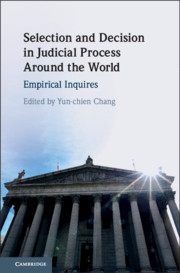Book contents
- Selection and Decision in Judicial Process around the World
- Selection and Decision in Judicial Process around the World
- Copyright page
- Dedication
- Contents
- List of Figures
- List of Tables
- List of Contributors
- Acknowledgments
- Introduction
- 1 Do Patent Law Suits Target Invalid Patents?
- 2 Platform Procedure
- 3 Speedy Adjudication in Hard Cases and Low Settlement Rates in Easy Cases
- 4 How Lower Courts Respond to a Change in a Legal Rule
- 5 Career Judge System and Court Decision Biases
- 6 Judges Avoid Ex Post but Not Ex Ante Inefficiency
- 7 When Winning Is Not Enough
- 8 The Evolution of Case Influence in Modern Consumer Standard Form Contracts
- 9 Judging Insurance Antidiscrimination Law
- 10 Are Judges Harsher with Repeat Offenders?
- 11 Does Efficiency Trump Legality?
- Index
- References
6 - Judges Avoid Ex Post but Not Ex Ante Inefficiency
Theory and Empirical Evidence from Taiwan
Published online by Cambridge University Press: 04 December 2019
- Selection and Decision in Judicial Process around the World
- Selection and Decision in Judicial Process around the World
- Copyright page
- Dedication
- Contents
- List of Figures
- List of Tables
- List of Contributors
- Acknowledgments
- Introduction
- 1 Do Patent Law Suits Target Invalid Patents?
- 2 Platform Procedure
- 3 Speedy Adjudication in Hard Cases and Low Settlement Rates in Easy Cases
- 4 How Lower Courts Respond to a Change in a Legal Rule
- 5 Career Judge System and Court Decision Biases
- 6 Judges Avoid Ex Post but Not Ex Ante Inefficiency
- 7 When Winning Is Not Enough
- 8 The Evolution of Case Influence in Modern Consumer Standard Form Contracts
- 9 Judging Insurance Antidiscrimination Law
- 10 Are Judges Harsher with Repeat Offenders?
- 11 Does Efficiency Trump Legality?
- Index
- References
Summary
This book chapter advances a hypothesis that judges tend to avoid ex post inefficiency (that is, inefficiency falling to litigants), but judges are less inclined to avoid ex ante inefficiency (that is, inefficiency incurred by future parties). Drawing on three empirical studies which the author has conducted on property cases rendered by courts in Taiwan, this chapter presents preliminary evidence to test this hypothesis. The three studies are consistent with the hypothesis, as judges avoid ex post inefficiency in two studies (co-ownership partition and building encroachment) but fail to avoid ex ante inefficiency in one study (trespass to land).
Keywords
- Type
- Chapter
- Information
- Selection and Decision in Judicial Process around the WorldEmpirical Inquires, pp. 160 - 178Publisher: Cambridge University PressPrint publication year: 2019
References
References in English
References in German
- 1
- Cited by

